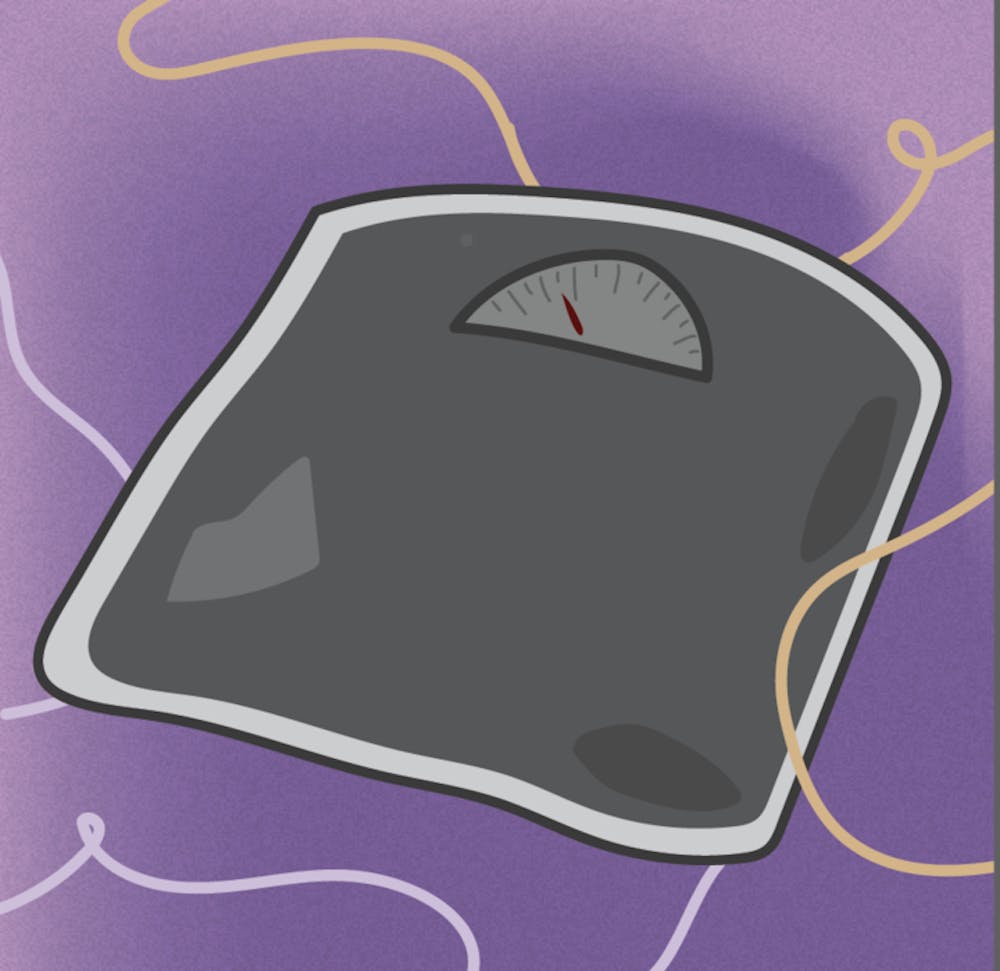I hid my scale in April 2020, knowing that the many hours of boredom–induced eating would catch up to me at some point. At the same time, I watched the light purplish–brown stripes on my stomach flourish and thrive as I withered with each day of lockdown.
Vehemently disliking my body was not a foreign concept to me—I remember having qualms about the size of my stomach at seven years old. The early days of lockdown, though, made me face my feelings about my body in an entirely different way. There were no distractions, no structured activities—nothing to help me ignore how badly I felt about myself. It didn’t matter that I was adjusting to unstimulating online classes, having sophomore year stolen from me, helping my mother recover from a rough bout of COVID–19, or just existing at a time that felt like the apocalypse. None of that mattered when I saw those stretch marks.
Instead of doing anything to change how I felt, I spiraled. I took great care not to look at myself in the mirror and to distract myself at all moments of the day. TikTok, trashy reality television, rewatching my comfort movies, and playing video games I hadn’t touched in years filled my days instead of anything remotely productive or positive.
A few months later in early June of that year, Philadelphia started lifting lockdown restrictions, and I had no other choice but to start being perceived by the world again. I was desperate to return to some semblance of normalcy, but scared shitless by the prospect of summertime. Instead of the tan skin and light freckles I donned each summer, my face was pale, revealing the look of someone who spent their lockdown in the city. My body was peppered with more cellulite and stretch marks than ever.
The spiraling continued, and I opted to cover things up rather than address them. At the time, I was going to therapy every few weeks, but the self–negligence seeped into that, too. Instead of discussing my body image, I talked about all the other shit that sucked at the time (there was a lot). I also decided to make jeans a year–round clothing staple, even if the forecast said it would be 90 degrees and sunny. I took transportation—buses, Ubers, my little brother’s car—whenever I could. Walking in the city, an activity that used to be therapeutic for me, would leave me exposed. I preferred to be sheltered in the car, only visible from the shoulders down.
I hid, ordered a lot of takeout, read books, saw some friends, and worked. I settled into that routine for the first half of the summer, blissfully indolent. I did a good job of showing people the opposite, so much so that sometimes I’d even fool myself into thinking I was okay.
In July of 2020, I had an unremarkable hookup with a boy who previously rejected me in high school. That rejection happened in 2016, and in the years following, I clung onto it, letting it sting me as our friendship developed. He wanted my friendship, but not my body. Knowing that hurt, and instead of moving on, I convinced myself that the barrier between myself and the love I craved was my body.
I graduated high school in 2018, and the pain waned. College came shortly after and changed things, as it usually does. I was distracted by the chaos that is the first year of college and simply didn’t have the time to hate myself as frequently as before. However, insecurity still gnawed at me, and its relative inertia came to an end during the second half of my sophomore year when lockdown began.
It pains me to give credit to a mediocre hookup for changing how I felt about myself, but it shattered the facade of self–loathing I had spent so much time and effort building. For years, I convinced myself that my body was the problem, but at my heaviest and least confident, we hooked up. After giving so much power to the idea that my body was a repulsive thing that prevented me from receiving romantic interest and love, I realized that it was all in my head.
As the summer progressed and I was perceived by society in all my cellulite–speckled glory, I started to realize that nobody cared about what I looked like. Don’t get me wrong—I didn’t emerge from the hookup immediately transformed and preaching the gospel of self–love. But little by little, the interactions I would cherry–pick to enable my self–hatred would come accompanied with a refutation. A core assumption I had made was false, and I had proof for it. I wasn’t going to let myself fall down the rabbit hole again on a possibly false assumption.
I kept myself in my newfound mindset as COVID–19 protocols warranted Zoom classes where I was perceived only from the shoulders up. I had an opportunity to spiral back as COVID–19 cases worsened in the autumn and winter, but I didn’t. Instead, I indulged in pandemic–induced online shopping sprees and bought spring and summer clothes that would actually fit me instead of attempting to squeeze into shorts that were a size too small.
Now, as I live my life in person and in public for the first time in a while, much has changed. The purple stripes on my stomach have faded to a softer brown, no longer as jarring to me as they were last April. I’ve made some sort of standing peace with what I look like. I don’t like myself all the time, and love is a strong word reserved for special occasions, but I don’t hate myself. I believe that in many ways, that’s the most radical form of self–love there is.

